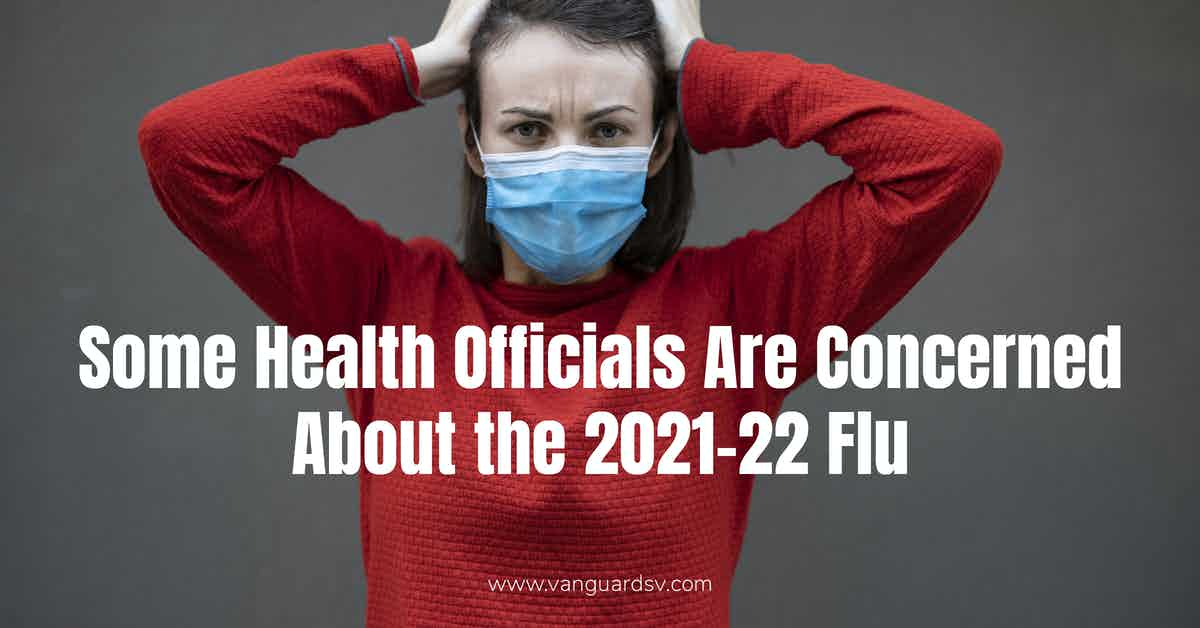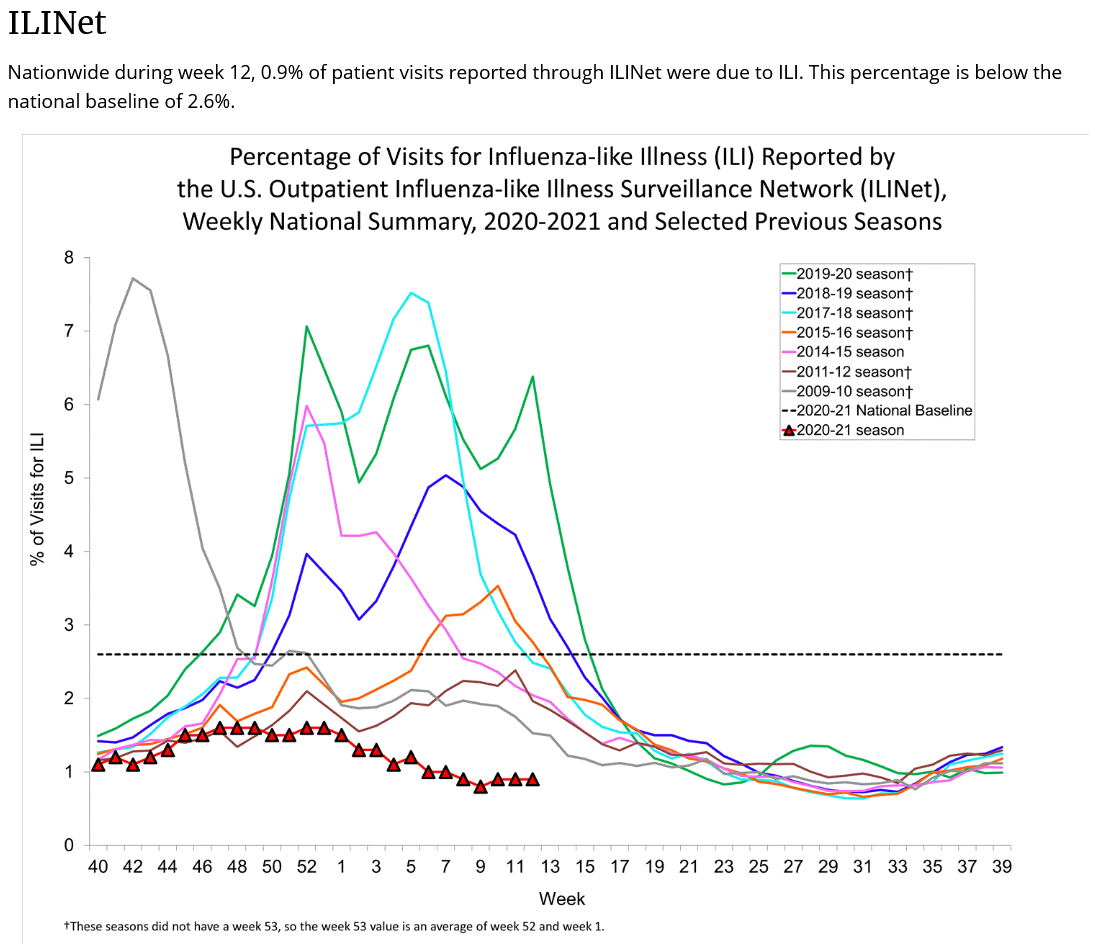A hypothetical scenario regarding a potentially devastating 2021-22 influenza season starting this fall is gaining some steam as health officials worry that a diminished 2020-21 season has left many unexposed and vulnerable.

Dire Predictions Regarding the 2021-22 Influenza Season
The 2020-21 influenza season was a small boon to overtaxed healthcare systems already working at capacity to address the ongoing SARS-CoV-2 outbreak.
According to the U.S. Centers for Disease Control and Prevention's FluView website, the entirety of the 2020-21 influenza season saw minimal reported instances of influenza-like illness (ILI) across the country.
The only notable exception came out of Iowa during the first week of November 2020, which saw a spike in reported cases that ranged up to the "very high" level, with one death reported.
Many healthcare officials attribute the significant decline to extreme measures implemented to combat the spread of SARS-CoV-2, including:
- Social distancing.
- Work from home initiatives.
- Increased cleaning frequencies, and;
- Targeted fomite disinfection.
On the surface, most people would consider this good news.
Still, many healthcare officials have sounded an alarm regarding the lack of exposure to the virus and how that will impact the population next season, especially among the most vulnerable.
According to cleaning industry online magazine, CleanLink;
During a typical flu season, babies and young children are the ones who prove most susceptible to infection because those individuals haven't been exposed before.
But when few people of any age are infected in one season, more people are fair game for the flu.
Scott Hensley, a microbiologist at the University of Pennsylvania Perelman School of Medicine, told NBC News that there could be a rise in cases throughout the population, as well as pediatric deaths due to the flu.
Among the key concerns regarding the potential for a bad 2021-22 influenza season is the apparent low genetic diversity of influenza strains observed over the last year--something you typically want when predicting what strains should be accounted for in a vaccination.
The problem that is currently troubling health officials is whether or not the current information represents an actual low diversity level or a poor sampling due to fewer people going to the hospital, which could significantly impair the ability of pharmaceutical companies to properly predict the strains which the next vaccine will need to protect us from, ultimately resulting in increased illness, hospitalizations, and deaths.
According to NBC News;
It’s unclear whether there are actually fewer strains circulating, or if there has just been limited sampling of the virus because there have been so few cases, meaning it may be possible other strains are out there that haven’t been detected.
Which of these scenarios turns out to be the case could have a significant impact on next season’s flu vaccine, which is made yearly to protect against the most prominent virus strains circulating around the globe.
If there are truly fewer strains circulating, then the vaccine stands a better chance of being a good match, making it more effective.
In recent years one prominent strain, H3N2, has been problematic since there were so many substrains of it, making it more difficult for a vaccine to broadly protect against it.
After year with virtually no flu, scientists worry the next season could be a bad one
Protecting Yourself and Others From the Flu
Protecting yourself and others from the spread of influenza and other commonly transmitted diseases is a well-documented process with a significant body of scientific research to back it.
- Get vaccinated.
- Stay home if you feel sick, and contact a healthcare provider if symptoms begin to worsen.
- Avoid large crowds as much as possible, especially in facilities with poor ventilation.
- Pay attention to where you put your hands when you're out in public.
- Wash your hands well and often with soap and water.
- Use hand sanitizer when soap and water are not immediately available.
- Cover your mouth or nose when you cough or sneeze.
- If community infection begins to go up, increase cleaning frequencies in your facility.
- If infections in your facility begin to rise, increase targeted disinfection services, and consider daily electrostatic disinfection treatments proven effective in the past, specifically in preventing outbreaks in elementary schools.
Takeaway
Regardless of the nature of the upcoming influenza season, practical steps can prevent a mass outbreak and spread.
Influenza, like SARS-CoV-2, is an enveloped virus, which makes it extremely susceptible to increased cleaning frequencies using commercial-grade detergents and microfiber.
Unlike SARS, influenza is largely spread through contact with an infected person or a contaminated surface--underscoring the importance of high-performance cleaning and hand hygiene programs.
Outsourcing is an effective method for onboarding the critical skills and in-demand services necessary to protect your facility and its occupants this influenza season and year-round.
If you would like more information regarding the effectiveness of high-performance infection prevention and control measures, or if you would like to schedule a free, no-obligation onsite assessment of your facility's custodial needs, contact us today for a free quote!
In Bakersfield, CA, call (661) 437-3253
In Fresno, CA, call (559) 206-1059
In Valencia CA, or Santa Clarita CA, call (661) 437-3253
In Palmdale, CA or Lancaster, CA, call (661) 371-4756



You must be logged in to post a comment.